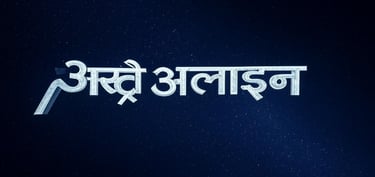Kundli Matching: Vedic Astrology Compatibility Guide
Discover why Kundli matching is essential in Vedic astrology. Learn how astrology matching influences compatibility and relationships. Explore the significance of Kundli compatibility for a harmonious partnership.
7/24/20254 min read


Introduction to Kundli Matching
Kundli matching is a fundamental practice in Vedic astrology that plays a pivotal role in assessing compatibility between prospective partners. A Kundli, or natal chart, is essentially an astrological map created based on an individual's date, time, and place of birth. This chart represents the position of various celestial bodies at the moment of birth, and is crucial for determining many aspects of a person's life, including their personality, relationships, and potential for harmony in marriage.
The significance of Kundli matching in Hindu marriages cannot be overstated. Traditionally, it is believed that when two individuals are matched astrologically, it can lead to a more balanced and fulfilling partnership. Families often rely on this astrological evaluation before proceeding with a marriage proposal, seeing it as a way to mitigate potential conflicts and ensure long-term compatibility. The cultural relevance of Kundli matching indicates a deep-seated belief that cosmic alignment can greatly influence marital bliss.
In Vedic astrology, the analysis of compatibility involves various parameters, which include the positions of the Moon, Sun, and other planets in the respective Kundlis of the individuals. This assessment checks for the alignment of their life paths, emotional compatibility, and the potential for growth together. It includes several factors such as Guna Milan, which evaluates the matching of traits, and Dosha analysis, which helps identify any negative influences that could affect the relationship. Overall, the principles of Kundli matching aim to provide insights into how well-suited two people are for each other based on astrological insights.
Factors Considered in Kundli Matching
Kundli matching is an essential practice in Vedic astrology, used to assess the compatibility between individuals seeking marriage. Several factors are meticulously analyzed by astrologers during this process. The placement of planets within each individual's birth chart, also known as the Kundli, forms the foundation of this compatibility assessment. The relative positions of the planets at the time of birth can significantly influence personal traits and behavioral patterns, ultimately affecting the dynamics of a marital relationship.
Another critical component in Kundli matching is the analysis of moon signs. The moon sign, which represents the emotional side of a person, offers insight into their feelings and reactions. A harmonious match often requires compatible moon signs that align in terms of emotional responses and expectations. Complementary moon signs can enhance communication and foster a deeper understanding between partners, promoting a balanced relationship.
Nakshatras, or lunar constellations, also play a pivotal role in determining compatibility. Each Nakshatra carries its unique characteristics and qualities that influence an individual's personality. By examining the Nakshatras of both partners, astrologers can gauge their compatibility based on shared attributes and tendencies, which further enrich the compatibility analysis.
Moreover, doshas, or flaws found in the Kundli, are scrutinized. Doshas can manifest various challenges in a relationship, such as Mangal Dosha, which may indicate potential obstacles. Identifying and interpreting these doshas enables astrologers to assess how they may impact the overall compatibility between partners.
The scoring system in Kundli matching, known as ‘Guna Milan,’ quantifies compatibility based on various factors. This point system evaluates specific attributes across multiple categories, with a higher score indicating a more harmonious potential relationship. Guna Milan thus serves as an essential tool in evaluating marital harmony, helping couples decide on their future together.
Benefits of Kundli Matching for Relationships
Kundli matching, a practice rooted in Vedic astrology, serves as a significant tool in assessing compatibility between prospective partners. One of the primary benefits of conducting Kundli matching prior to marriage is the potential to prevent future conflicts. By analyzing various aspects such as the alignment of stars and planetary positions, couples can gain insights into their compatibility levels, providing a strong foundation for a harmonious relationship.
This process enhances understanding between partners, as it brings to light important personality traits and emotional needs. For instance, individuals may discover that their temperaments are significantly different, leading to potential areas of conflict. Armed with this knowledge, couples can engage in meaningful discussions to address and bridge these differences, ensuring that both parties enter the marriage with a clearer perspective on each other’s strengths and vulnerabilities.
Moreover, the psychological and emotional advantages of being aware of compatibility factors cannot be understated. Gaining reassurance from favorable Kundli matches can significantly reduce anxiety for both families involved. Knowing that the two individuals are not only compatible on a personal level but also aligned astrologically can foster a sense of peace and acceptance among family members. This shared understanding often cultivates a supportive environment leading up to the wedding.
Real-life examples further emphasize the positive outcomes of Kundli matching. Many couples who have engaged in this practice report a smoother path to marital bliss, as evidenced by testimonials highlighting enhanced communication, deeper emotional connections, and a more profound respect for one another’s familial values. Such stories illustrate that when couples take the time to understand their compatibility through Kundli matching, they are more likely to experience a successful marriage built on mutual trust and respect.
Common Misconceptions and Challenges
Kundli matching, often viewed through a skeptical lens, encounters several misconceptions, particularly the notion that it is purely a superstitious practice with no relevance in modern relationships. This belief undermines the rich cultural significance of Vedic astrology and the role it plays in establishing compatibility between partners. In reality, Kundli matching provides insights based on a comprehensive analysis of one's astrological charts, which can aid individuals in understanding their relational dynamics better. However, the idea that such compatibility is the sole determinant of a successful relationship is misleading.
Couples often face challenges when their Kundlis indicate a lack of compatibility. These challenges can evoke feelings of anxiety or uncertainty regarding their future together. For many, the fear of astrological mismatch may lead to discouragement, promoting a sense of fatalism about love. Nonetheless, it is crucial to remember that successful relationships are bolstered not just by astrological alignedness but also by the strength of love, understanding, and communication between partners. Building a strong foundation of mutual respect and open dialogue can often bridge the gaps indicated by Kundli mismatches.
Moreover, the complexity of human emotions should not be underestimated; love often transcends the limitations set by astrological influences. Couples facing Kundli mismatches are encouraged to engage in honest conversations about their feelings, aspirations, and concerns. This practice fosters deeper connections that may mitigate the perceived implications of an incompatible Kundli. One must strive to find a balance between the spiritual guidance offered by Vedic astrology and personal autonomy in choosing one's partner. In doing so, individuals can appreciate the insights provided by Kundli matching while also embracing the rich tapestry of love and partnership that define their unique relationship journey.
Discover AstroAlign—your gateway to personalized horoscopes, detailed natal charts, and cosmic insights. Align your life with the stars through expert guidance rooted in astrology and Vastu. Whether seeking clarity, luck, or balance, AstroAlign helps you harmonize your energy and unlock your spiritual potential. Your destiny, decoded.
Insights
Charts
+91-7065939563
© 2025. All rights reserved.


